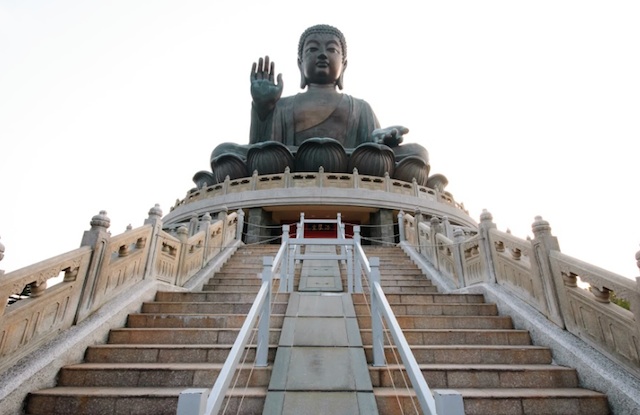I had just started waitressing at a greasy spoon café called Fast Eddy’s in the south of England, when a friend of the owner walked in and introduced herself as Nirvana.
‘I’ve been looking for you!’ I said to her.
‘I’m just down the road.’ she replied, smiling easily at me with her bright blue eyes before taking a seat in one of the booths for her fried breakfast. I smiled back at her as I went back to wiping down tables, thinking to myself,
‘Ah if only it were that easy.’
In case you haven’t heard of nirvana— the Buddhist concept, not the girl I had just met or the band—in the words of the Dalai Lama, nirvana is a state beyond ‘negative emotions and thoughts, beyond all sorrow.’ When we reach nirvana we feel inner peace because we are liberated from our suffering—suffering that derives from our attachment to the world, our sense of identity, worries and ideas of what we think our life should look like or not. When we are attached to the world and our ideas of how it should be, we suffer when reality doesn’t match up to our expectations and feel inner conflict and pain.
Awash with shame and confusion, and in the aftermath of the nervous breakdown, which had led to me leaving University, I was desperately seeking inner peace and liberation from my suffering.
I began studying the teachings of Buddhism, reading books on Hinduism, Philosophy and Human Potential but soon found that knowledge was not enough.
In order to truly attain nirvana, I needed to engage in daily spiritual practice like meditation. After all, according to Buddha, ‘When a man has both meditation and wisdom, he is indeed close to nirvana.’
I signed up for yoga and meditation classes at the local community centre. I especially enjoyed the afternoon classes where most of the attendees were retirees and senior citizens and much less flexible than me. I often fell asleep during the meditation portion of the class or relaxation part at the end, but I kept going back in the hopes of deepening my understanding of yoga and spirituality.
One day I saw a flyer in a vegetarian restaurant for yoga and meditation classes that promised to help you enhance your energy. I made my way to the homes of the yogis who taught the class in their apartment on a cliff with big bay windows overlooking the ocean. These yogis brought me to such a deep state of relaxation and stillness (without me falling asleep) during their classes that I knew they offered something different and deeper to the other yoga and meditation classes I had attended.
Eager to learn more I moved in with the yogis, much to the delight of my very Catholic parents. My best friend steeled herself to be ready at a moment’s notice to rescue me from the grips of the cult I had surely joined. As it turned out, much to the surprise of my loved ones, I did not need rescuing. Over the course of the year that I lived with them, these yogis taught me about the true dedication and discipline needed to walk a spiritual path and find nirvana.
I am not a morning person and have never been. Many a cold wintry morning, when the yogis woke me up before dawn to meditate, I resented the loss of the extra hours in bed I could have had under my warm blanket. My inner belief in the practice I had undertaken and the trust that it would help me find nirvana kept me going; even when my body was weak, the yogis kept my spirit strong. For me, this was a turning point in my search for nirvana.
Spiritual awakening is awakening from the dream of thought. ~ Eckhart Tolle
Meditating with the yogis for a year also helped me to detach from my thoughts and dislodge me from my neuroses. I gradually became conscious of an inner awareness beyond my mental conflicts and incessant worries. The mind is a very powerful thing and we can create joy or misery by the way we think about things.
Once our lives don’t look the way we think it should, we can become unhappy because we cannot accept and find the satisfaction in what our lives actually are.
We fight reality and find conflict instead of freedom by finding the meaning and potential in what lies before and within us. Once we realize that we are not our thoughts but the consciousness beyond them, we can chose to disengage from our negative thoughts and rest in our greater consciousness, which is always free, and at peace.
Meditation was the first of many spiritual disciplines that have helped me on my path to find nirvana. It’s been almost 20 years since I started meditating and I feel that it’s one of the most valuable and powerful spiritual practices that I learned. It gave me a space between my experience of life and how I react to it. In that space, I found hope.
According to Brene Brown, a researcher from the University of Houston, hopeful people put ‘considerable value on persistence and hard work.’ In other words, hope is earned—the reward of your perseverance and commitment.
The road to nirvana is paved with the short-lived intentions and short-term efforts of spiritual aspirants that give up when the going gets tough and uncomfortable.
If you truly want to gain any traction on your spiritual path, I found that you need stamina to keep going and believe in where you are headed, even when your very Catholic parents and best friend are sure you joined a cult. The spiritual discipline of meditation helped me find an inner peaceful centre beyond all thought–the core of me that observes my life, unfettered, unbothered and neutral, otherwise known as nirvana.
And as it turned out, with practice and persistence, nirvana was really just down the road.
Love elephant and want to go steady?
Sign up for our (curated) daily and weekly newsletters!
Apprentice Editor: Sarvasmarana Ma Nithya/Editor: Catherine Monkman
Photo: Pixoto/Marvin Lim













Read 0 comments and reply